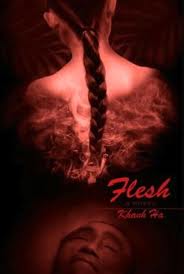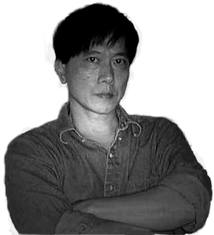Join Khanh Ha, author of the historical literary novel, Flesh, as he tours the blogosphere August 6 – September 29, 2012 on his first virtual book tour with Pump Up Your Book!ABOUT FLESHThe setting is Tonkin (northern Vietnam) at the turn of the 20th century. A boy, Tai, witnesses the beheading of his father, a notorious bandit, and sets out to recover his head and then to find the man who betrayed his father to the authorities. On this quest, Tai’s entire world will shift. FLESH takes the reader into dark and delightful places in the human condition, places where allies are not always your friends, true love hurts, and your worst enemy may bring you the most comfort. In that emotionally harrowing world, Tai must learn to deal with new responsibilities in his life while at the same time acknowledge his bond, and his resemblance, to a man he barely knew-his father. Through this story of revenge is woven a another story, one of love, but love purchased with the blood of murders Tai commits. A coming-of-age story, but also a love story, the sensuality of the author’s writing style belies the sometimes brutal world he depicts.
Today I am featuring a guest post from the author. Watch for a review coming very soon!
The Footsteps I Follow: Authors I Admire
The other day a writer asked me on AQ Connect what she needed as a newbie to sail across the writing and publishing ocean. I told her to buy and keep in her safe the following two titles (before she is ready for a literary agent—one who will ferry her across the capricious sea):
• Self-Editing for Fiction Writers (Renni Browne and Dave King)
• The Elements of Style (William Strunk and E. B. White)
I told her to read just the opening of these two novels:
• A Farewell to Arms (Ernest Hemingway)
• The English Patient (Michael Ondaatje)
She said, “That’s it?”
I said, “Yes.”
For a moment I was reliving my own journey. Like a paper moon sailing over a cardboard sea.
But my own journey as a writer started when I had—for the first time—a taste of dark, turbulent scenes ever written by some of the authors I venerated. I write literary novels. I like to write dark, turbulent novels. ‘Then I want to do it better than anybody has ever done it which makes it into an obsession. An obsession is terrible.’ [Hemingway]
On Death Scenes
It happens. Somebody dies. Death can occur in the middle or the end of a novel. Someone’s death could spin the story around. It could be the protagonist’s death.
When death comes in the ending, devastation strikes the reader. Each writer writes his death scene with trepidation. How much should he write it without overwriting it?
Some death scenes are so memorable they never leave your memory as long as you read books. The first that comes to mind happens in the ending of A Farewell to Arms by Earnest Hemingway. Here is the scene that captures the moment after the death of the protagonist’s lover in a hospital. The doctor then offers to take him back to his hotel.
“Good night,” he said. “I cannot take you to your hotel?”
“No, thank you.”
“It was the only thing to do,” he said. “The operation proved—"
“I do not want to talk about it,” I said.
“I would like to take you to your hotel.”
“No, thank you.”
He went down the hall. I went to the door of the room.
“You can’t come in now,” one of the nurses said.
“Yes, I can,” I said.
“You can’t come in yet.”
“You get out,” I said. “The other one too.”
But after I got them to leave and shut the door and turned off the light it wasn't any good. It was like saying good-by to a statue. After a while I went out and left the hospital and walked back to the hotel in the rain.
“No, thank you.”
“It was the only thing to do,” he said. “The operation proved—"
“I do not want to talk about it,” I said.
“I would like to take you to your hotel.”
“No, thank you.”
He went down the hall. I went to the door of the room.
“You can’t come in now,” one of the nurses said.
“Yes, I can,” I said.
“You can’t come in yet.”
“You get out,” I said. “The other one too.”
But after I got them to leave and shut the door and turned off the light it wasn't any good. It was like saying good-by to a statue. After a while I went out and left the hospital and walked back to the hotel in the rain.
To date, I have always thought that the best—very best —prose ever written in the English language is found in the opening and the ending of A Farewell to Arms. And if you are keen enough as a reader, you will notice its influence on Cormac McCarthy’s prose especially in his award-winning novel All The Pretty Horses.
That brings us to Cormac McCarthy whose hero in All The Pretty Horses meets his death in Cities of The Plain, last book of the trilogy. In this scene, John Grady Cole lies dying from a knife wound and his friend, Billy Parker, goes out to get Cole a glass of water. When he comes back, death has taken his friend away.
When he got to the packingcrate the candle was still burning and he took the glasses both in one hand and pushed back the sacking and crouched on his knees.
Here you go, bud, he said.
But he had already seen. He set the waterglasses slowly down. Bud, he said, Bud?
The boy lay with his face turned away from the light. His eyes were open. Billy called to him. As if he could not have gone far. Bud, he said, Bud? Aw goddamn. Bud?
Aint that pitiful, he said. Aint that the most goddamn pitiful thing? Aint it? Oh God. Bud. Oh goddamn.
When he had him gathered in his arms he rose and turned. Goddamn whores, he said. He was crying and his tears ran down his angry face and he called out to the broken day against them all and he called out to God to see what was before his eyes. Look at this, he called. Do you see? Do you see?
Here you go, bud, he said.
But he had already seen. He set the waterglasses slowly down. Bud, he said, Bud?
The boy lay with his face turned away from the light. His eyes were open. Billy called to him. As if he could not have gone far. Bud, he said, Bud? Aw goddamn. Bud?
Aint that pitiful, he said. Aint that the most goddamn pitiful thing? Aint it? Oh God. Bud. Oh goddamn.
When he had him gathered in his arms he rose and turned. Goddamn whores, he said. He was crying and his tears ran down his angry face and he called out to the broken day against them all and he called out to God to see what was before his eyes. Look at this, he called. Do you see? Do you see?
Death claims author Ian Frazier’s young brother in his non-fiction book Family. In his well concealed emotion, Frazier detaches himself from the scene as his beloved brother breathes his last breath.
We stood around the bed and told him we loved him, in raised voices, as if through the windows of a departing car. His breathing became so shallow that his chest barely moved; then it didn’t move at all; then all that was left was a muscle reflex moving in his yellowed neck; then that faded, too. The nurse came over and removed the oxygen mask and turned off the flow of oxygen from a switch on the wall. Darkness filled his open mouth.
After Flesh (Black Heron Press, 2012), I wrote a novel whose ending witnesses the death of the main character. He is shot and dies in his lover’s arms.
He fell. The lights glared beyond. He got up, fell, and got up again. He saw lights wildly searching the darkness and heard voices descending on him.
She cradled him, weeping. He woke as if to a whitewashed memory and in that moment he knew all that he had lived through. He saw her eyes and her face as if he had never left her, as if nothing had happened or changed, like the smell of the earth.
“Jonathan! Speak to me, Jonathan!”
She turned him on his side so her warmth would keep him awake.
“Hold on, Jonathan. Just hold on.”
Red hot pain dimpled his back, so hot his breath seemed to flame. He felt her hands touching his back and saw they were red when she covered her mouth.
“Wrap him. Stop the bleeding,” someone said, hovering over him.
A monk. He knew the face, but the name didn’t come. Hands touching him. His body no longer seemed to belong to him. He felt an energy shrouding him and a deafening commotion without sound. He saw a young girl who smiled as she walked hand in hand with him through a valley yellow and red with autumn. He saw cranes sleeping in the lagoon at low tide, and among their mirrored white bodies he saw himself cloaked in white.
She pressed her cheek against his. “Jonathan.”
He closed his eyes; the scent of the earth came to him. He saw her eyes very close to his, then his head fell against her chest. The dimple of pain went away. [HER]
ABOUT KHANH HA
Khanh Ha was born in Hue, the former capital of Vietnam. During his teen years he began writing short stories which won him several awards in the Vietnamese adolescent magazines. He graduated from Ohio University with a bachelor’s degree in Journalism. Flesh is his first novel. He is at work on a new novel.
To find out more visit his website at : http://www.authorkhanhha.com/ or his blog at: http://authorkhanhha.blogspot.com/
To follow the entire tour, click here.





0 comments:
Post a Comment